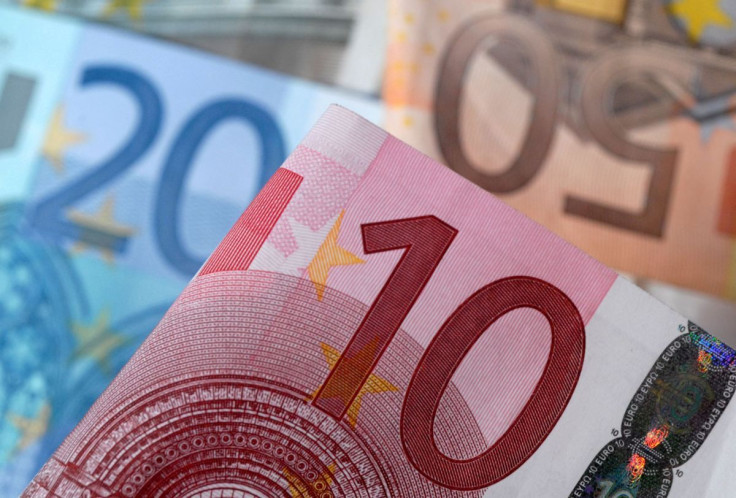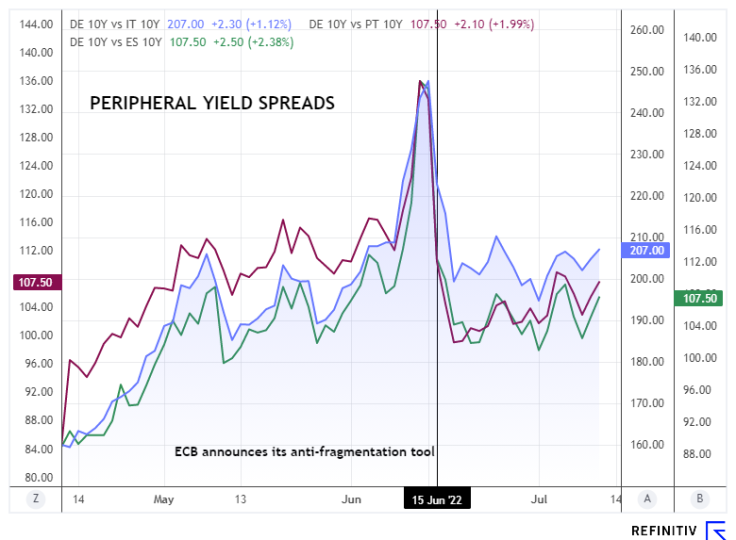Euro Zone Bond Yields Tumble Amid Economic Outlook Fears

Euro zone government bond yields fell on Tuesday as money markets scaled back their expectations of European Central Bank's rate hikes amid concerns over potential gas supply cuts.
Physical gas flows through the Nord Stream 1 pipeline from Russia to Germany fell to zero on Monday as maintenance of the pipeline began.
Governments, markets, and companies are worried the shutdown might be extended due to the war in Ukraine and that reflected in data showing German investor morale nosediving in July, falling below levels at the start of the pandemic.
Those concerns have led some analysts to forecast a quick pace of ECB hikes in 2022 and a halt in 2023 as the euro area is expected to slow significantly due to the impact of surging energy prices and a possible reduction in gas supply.
On Tuesday, Germany's 10-year government bond yield fell as low as 1.094%, nearing a six-week low and was down 13 basis points (bps) to 1.12% by 1513 GMT.
Yields fell as money markets scaled back bets on European Central Bank rate hikes to 137 bps by December and bets on the terminal rate declined to around 1.3% in December 2023, from around 1.45% on Monday, according to Refinitiv data.
"We see room for the Bund yields to decline to the bottom of the recent range," said Mohammed Kazmi, portfolio Manager at Union Bancaire Priv?e.
Peripheral bonds underperformed for some of the session on concerns around the ECB's so-called anti-fragmentation tool.
The bank has pledged work on a tool to contain an "unwarranted" divergence between the borrowing costs of debt-laden member states like Italy and Germany's that might hamper monetary policy transmission across the bloc.
Hawkish policymaker Joachim Nagel said late on Monday that the ECB should model it on the one announced during the debt crisis, the Outright Monetary Transactions programme (OMT) which allows the ECB to buy unlimited amounts of bonds from countries that apply for a bailout from the European Stability Mechanism.
He added on Tuesday that current differences in yields were "fundamentally justified" until proven otherwise.
The closely-watched spread between Italian and German 10-year yields widened at one point to 208 bps, but was last unchanged at 205 bps.
GRAPHIC: Yield spreads

"Nagel's remarks don't help, but I don't think there's any real news about the anti-fragmentation tool. If markets were disappointed, we would see much higher spreads as markets would test the ECB's resolve," UBP's Kazmi argued.
On the political front, Italian Premier Mario Draghi met on Monday with Italy's president to discuss the future of his government amid simmering tensions with coalition member the 5-Star Movement.
"There's a bit of political noise affecting spreads with Five Star providing less support for the Draghi government. Our base-case scenario is that Draghi will stay as a prime minister, without snap elections this year," he added.
In a syndicated debt sale, the European Union raised 8 billion euros from a new seven-year bond and a reopening of a 20-year bond backing its COVID-19 recovery fund, according to a lead manager.
© Copyright Thomson Reuters {{Year}}. All rights reserved.





















